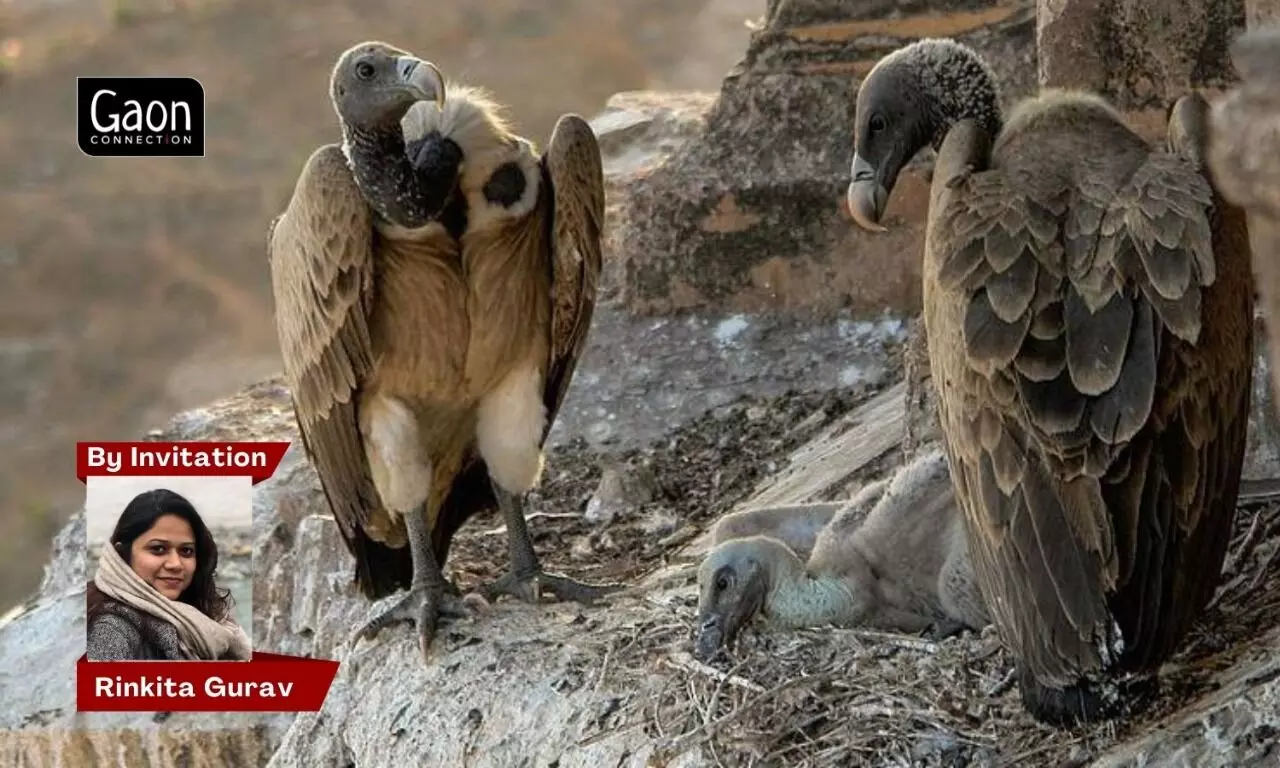Vultures are nature's eco-warriors
Vultures are excellent indicators of the ecosystem's health. They feed on dead animals and thus prevent the spread of disease by the cadavers on land and water. With citizen science and increased awareness about bird watching, this threatened species can be protected.
 Rinkita Gurav 3 Sep 2022 12:37 PM GMT
Rinkita Gurav 3 Sep 2022 12:37 PM GMT

Birds of prey or raptors are not something that an individual will encounter, or let me add it directly, 'pay attention' to when they live on the land of a wildlife rich country of tigers, lions, elephants, leopards and rhinos. We have so much attention given to the majestic large species that we ignore the smaller ones – soaring in the sky above.
Vultures have become stories of the past generations now. People who fall in the age group of 50s and 60s talk about them and how common it was to sight them even in the capital city of Delhi till the late 1980s.
I am not from Delhi and being born in the late 80s, I haven't ever witnessed a huge flock of vultures in the urban landscape. I have heard stories of vultures circling the Tower of Silence at Malabar Hill in Mumbai but have not witnessed vulture presence since their population crash.
Birds not only add to the aesthetic value of nature but are also excellent indicators of the ecosystem's health. With scarce populations of vultures in the country, it becomes important for the public to contribute in conservation of these majestic birds.
Vultures are majestic because they clean up our environment and halt the spread of any bacteria in the soil and water by feeding on dead animals.
India being an agrarian country dependent on livestock, we have a large number of dead animals thrown out near rivers or open fields but very few vultures to feed on them.
The absence of vultures – scavengers – has a catastrophic impact on the food chain. Feral dogs grow in large numbers because of availability of food and become rabid, cases of rabies and dog bites have also increased.
Also Read: In a first, radio tags help trace migratory routes of Himalayan Griffon vultures
Twenty thousand people in India have been recorded to die of rabies, this number rarely exceeded 2,000 before the year 2000. In the year 2014, 2015, 2016, 2018, 2019, 2020, the number of dog bites (per million population) recorded was 235,694; 207,691; 217,787; 268,378; 263,025 and 202,521, respectively.
In all these years, most of the dog bites recorded were from Uttar Pradesh, Puducherry, Sikkim, Gujarat, Goa, Bihar, and Tamil Nadu whereas Nagaland had the least cases.
With citizen science and increased awareness about bird watching, the public can contribute in identifying vulture species and recording their sightings on eBird. WWF India has started an annual vulture count in the month of September wherein training for identifying various species and using eBird is given to volunteers – mostly birders.
Also Read: Busting myths around snakes and snakebites
This year, WWF India has launched a poster depicting nine species of vultures found in India, the threat they face and what an individual can do to safeguard them. Using drugs like diclofenac, ketoprofen, nimesulide should be avoided while using meloxicam and tolfenamic acid (proven to be vulture safe) for veterinary treatment by cattle owners.
Citizens across the country can look for their nesting/ roosting sites around their villages and inform the forest department for further monitoring and protection of those sites. If there are any dead vultures found, people should immediately contact the forest department. Forest department will conduct a post mortem to find the cause of death and take appropriate mitigation measures for protecting the Schedule 1 species.
Other than these issues, people have begun poisoning carcasses with poisonous pesticides in retaliation to dogs and other animals attacking their cattle. Vultures accidently feed on these poisoned carcasses and eventually die.
People need to stop poisoning carcasses which are not intended to kill vultures but because of their nature, they die and their population reduces furthermore.
Small steps are necessary and taken by everyone collectively they can help in protecting these threatened species from extinction. Learning about their importance is the first.
Rinkita Gurav is Manager – Raptor Conservation Programme at WWF India. Since 2013 she has been working on saving vultures in India through advocacy, awareness and monitoring their populations in the wild.
#Vultures #wildlife #environment
More Stories




